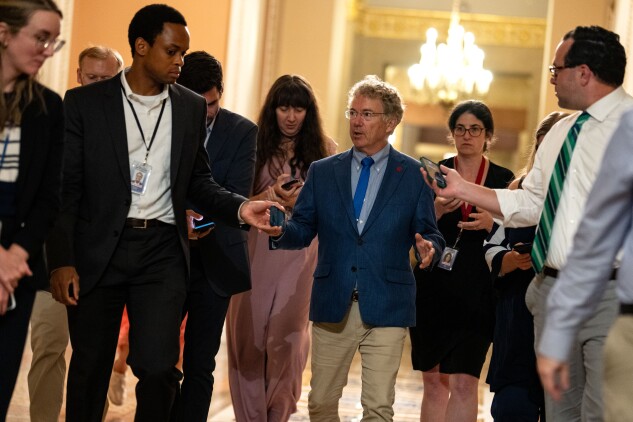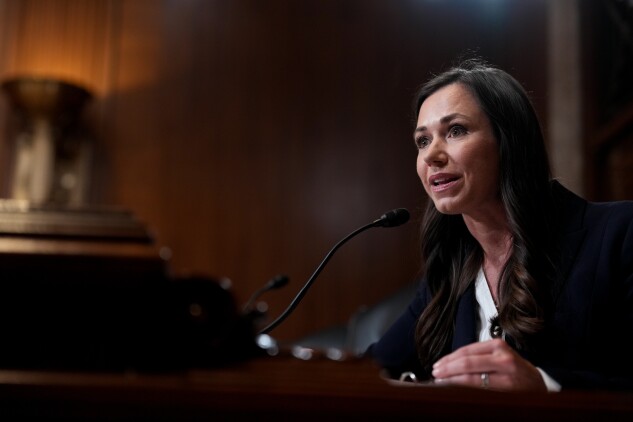Republicans who approved unprecedented immigration enforcement funding are now charged with policing how the Trump administration spends the money. Democrats and former homeland security officials question their commitment to the job.
GOP lawmakers last month passed landmark tax and spending legislation (
The Department of Homeland Security is now flush with cash to hire thousands of agents, build immigrant jails, and expand the border wall. The sudden influx of money—on top of its typical annual budget exceeding $60 billion—creates a serious risk of spending boondoggles, former officials say.
“The challenge is that the speed of the influx of dollars is enormous and the expectations are high,” said Chris Cummiskey, DHS’s top management official under Barack Obama. “When you have that happening, there’s sometimes an impulse to push dollars regardless of if you have everything lined up.”
Key Republicans who oversee the department have outlined emerging plans to keep tabs on DHS’s ledgers, but critics are skeptical as GOP lawmakers yield to Trump in repeated political battles.
“They thus far have really given Trump a rubber stamp on nearly everything,” said Maunica Sthanki, a political strategist and former Democratic aide on the House Judiciary Committee.
GOP Oversight Plans
The congressional committees that doled out DHS money in the bill have taken preliminary steps to conduct oversight since Trump signed it into law last month.
House Homeland Security Chairman
Senate Judiciary Chairman
Sthanki, the former Democratic aide, said one area Judiciary Democrats and Republicans could find common ground is how US Citizenship and Immigration Services uses increased fee revenue from the bill to address longstanding backlogs for work permits and other benefits. Lawmakers’ willingness to take up that bipartisan issue will serve as a test of their commitment to oversight, she said, adding that she’s skeptical it will happen.
Senate Homeland Security and Governmental Affairs Chairman
Sen.
Possible Waste
The emerging oversight plans come as DHS anticipates spending about $44 billion of the new funds in the coming fiscal year.
First up: a hiring spree. The administration is looking to add 10,000 ICE officers, 3,000 Border Patrol agents, and 5,000 customs officers. ICE launched a flashy recruitment website last week stocked with Uncle Sam imagery and made promises of hiring incentives, including a $50,000 signing bonus and student loan forgiveness.
The agency may waste taxpayer dollars by rushing to hire inadequately vetted candidates who turn out to be ill-suited to the job, said Gil Kerlikowske, Customs and Border Protection commissioner under Obama. “They’ll have to watch really carefully,” he added, referring to Congress.
Fast-tracked contract deals for companies to build detention space and expand the border wall may also be vulnerable to abuse, he said.
“Are they capable, or have they shown the proper genuflection to Trump?” Kerlikowske said. “That seems to drive a lot of the contracts.”
Critics worry the risk of wasteful spending is exacerbated by compromised accountability measures within the agency. For example, Democrats don’t trust DHS’s internal watchdog to conduct adequate oversight, citing concerns about Inspector General Joseph Cuffari’s independence.
Quality controls for the department’s acquisitions are also weakened because the Trump administration lacks Senate-confirmed officials to serve as under secretary for management or chief financial officer, Cummiskey said. The two roles coordinate spending across DHS’s often siloed agencies. Trump withdrew his nominee for the management job and hasn’t tapped anyone as CFO.
“It’s really easy for the components to blow off headquarters and say, ‘Hey, we’ve got our own relationship with the White House and on the Hill, so we don’t have to talk to you,” he added, saying that dynamic can lead to wasteful spending decisions.
Rep.
Appropriators Step Up
The typical overseers of DHS’s spending — congressional appropriators — sat on the sidelines while other committees crafted the spending bill earlier this year.
“Appropriations staff will watch keenly, but how much will their voice count to the elected officials?” Kerlikowske said.
Sen. Katie Britt (R-Ala.), who oversees DHS funding, insisted she’s taking an active role in overseeing the spending. Britt had a call with Noem last month to “make sure we know where everything’s going and that oversight and accountability is there,” she said in an interview.
Sen.
“We have a real hard time getting the department to respond to any of our inquiries,” he said. “I don’t know if that’s always the case when Republicans are asking, but they seem pretty dismissive of oversight attempts generally.”
DHS said it would comply with information-sharing requirements included in the law.
To contact the reporter on this story:
To contact the editors responsible for this story:
Learn more about Bloomberg Law or Log In to keep reading:
See Breaking News in Context
Bloomberg Law provides trusted coverage of current events enhanced with legal analysis.
Already a subscriber?
Log in to keep reading or access research tools and resources.



